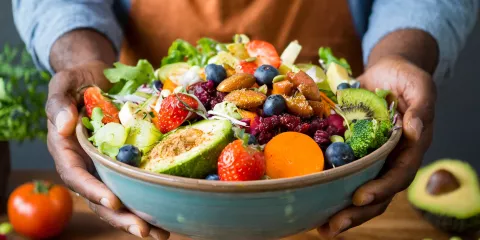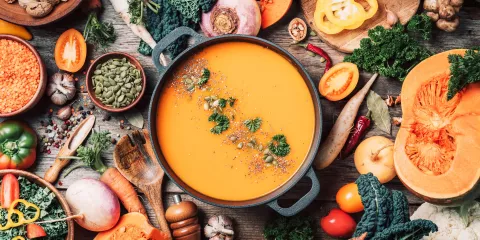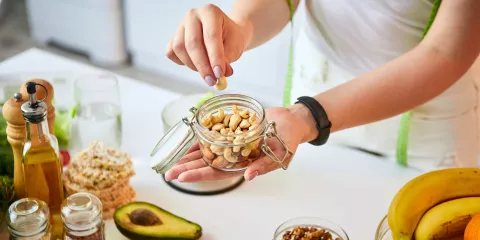
The gluten free diet has gained massive popularity in the last few decades. Is gluten bad? Does it help with weight loss? Are most people intolerant of gluten? (Also, what is gluten?)
In this post, we’ll give you an overview of the gluten free diet. This includes what it is, how to follow it safely and additional information about difficulty and supplementation.
We hope this post empowers you to make individualized dietary decisions alongside your healthcare provider.
What Is the Gluten Free Diet?
The gluten free diet avoids foods containing gluten. “Gluten” is actually a pair of two proteins, glutenin and gliadin.1-2 Most notably, it is found in grains such as wheat, barley and rye.2
Gluten gives bread a soft, spongy feel and helps to maintain its shape.1-2 It is also an additive in foods (more on that later).
Many people eat gluten-containing foods without issue. However, if you suffer from celiac disease or a gluten intolerance, you may not feel well after eating something with gluten in it. In these cases, avoiding or restricting your gluten intake often relieves symptoms.3 It is especially important to avoid gluten if you have celiac disease.
Related: The Great Gluten Debate
How to Follow a Gluten Free Diet (Safely)
When following a gluten free diet, all gluten foods (and gluten-containing ingredients) are avoided. Below, we’ll go in depth about what you can and can’t eat on a gluten free diet.
The goal of a gluten free diet is to avoid gluten while still maintaining as much variety and enjoyment as possible.
Nowadays, you can find all kinds of gluten free foods at the grocery store. There may even be entire sections dedicated to gluten free living. In some cases, you’ll see a “GF” icon on food packaging that tells you it is gluten free.
You may still have lots of questions like: What foods contain gluten? What foods are safe on a gluten free diet? Next, we’ll address those questions, starting with foods to avoid.
What Foods to Avoid on a Gluten Free Diet
If you have celiac disease, eating gluten can cause diarrhea, fatigue, bloating, gas, weight loss, malabsorption, abdominal pain, nausea, vomiting, constipation, anemia, skin rashes, ulcers, headache, joint pain, tingling, numbness and more.3 That’s why it’s exceptionally important that you avoid gluten at all costs.
If you have a gluten intolerance, symptoms vary. Gluten intolerance is diagnosed when symptoms are present, yet the person tests negative for celiac disease.4 Symptoms of gluten intolerance may include skin rashes, brain fog, ADHD behaviors, bloating, abdominal pain, diarrhea, headaches, bone or joint pain, fatigue and more.3-5 Gluten intolerance symptoms can be mild to severe and may depend on how much you eat.
Here are foods to avoid on a gluten free diet:2,6
- Wheat (including wheatberries, durum, semolina, spelt, farina, farro, graham, einkorn)
- Barley
- Rye (including pumpernickel)
- Triticale
- Breads, pastas, baked goods, cereals and snacks (made with wheat, barley, rye or triticale)
- Oats (although, oats labeled “gluten free” are okay)
- Pancakes, waffles, crepes, biscuits
- Breading mixes (panko)
- Flour tortillas
Luckily, you can find great gluten free alternatives to the foods listed above!
Hidden Sources of Gluten in Food
Many other foods contain gluten as well. Gluten-containing ingredients are added to food for taste, nutrition or other reasons.
Other sources of gluten in food include:2,6
- Soups (especially creamy soups)
- Sauces (such as a roux)
- Salad dressings
- Soy sauce
- Food colorings
- Malt (malted milk, malt syrup, malt vinegar)
- Beer, ale, lager (although, “distilled” is okay)
- Brewer’s yeast
- Granola or energy bars
- Snack seasonings (may contain malt vinegar or wheat starch)
- Processed lunch meat
- Candy
- Multigrain tortilla chips
- Starch, dextrin
- Brown rice syrup (may be made from barley)
- Meat substitutes (seitan)
- Scrambled eggs at restaurants (may add things like pancake mix)
- Herbs, teas, vitamins or nutritional supplements (may have gluten-containing ingredients)
- Foods with the potential for gluten cross-contamination
It may seem like all foods have gluten, but that’s not the case! Remember: Food label reading is critical when following a gluten free diet. When comparing options, look out for gluten-containing ingredients on the label.
Related: Marketing Buzzwords vs Meaningful Food Labels
Gluten Free Diet FAQs
We’ll answer some commonly asked questions about the gluten free diet so that you can better determine if it’s right for you.
What Are the Benefits of the Gluten Free Diet?
There are very specific benefits to the gluten free diet, such as:
- Helps with celiac disease management: People with celiac disease can see drastic improvement (even elimination) of symptoms. A completely gluten free diet can also help heal their gut.3
- May reduce symptoms of gluten intolerance: Whether or not you have a diagnosed gluten intolerance, some people feel better when they avoid gluten. Even though many people come to this conclusion themselves, talk to your dietitian and doctor to confirm.
Is it Hard to Follow a Gluten Free Diet?
Compared to other diets, following a gluten free diet isn’t too difficult. With so many commercially prepared gluten free breads, pastas and snack items available, most people can find a gluten free alternative that they enjoy. You can also browse the Internet for countless gluten free recipes.
The challenge of gluten free living is avoiding all hidden sources of gluten. For people with celiac disease or a severe gluten intolerance, a small slip-up could cause a severe onset of symptoms. If you follow a gluten free diet for other reasons, small exposures to gluten may have no effect on you.
Are There Safety Concerns with the Gluten Free Diet?
Prior to starting a new diet, consult your doctor and/or dietitian. Certain diets can put you at risk for nutrient deficiencies, worsening of health status, and/or adverse drug-nutrient interactions.
Let’s talk about safety concerns for the gluten free diet:
- Potential for disordered eating:A gluten free diet may require food restriction, label reading and food awareness. In certain people, this can lead to food obsession and/or eating disorders.
- Potential for unnecessary food restriction: This is common in people who are not well-educated about gluten. Rather than avoiding gluten, they avoid all grains and starches. Remember: Gluten is not synonymous with grains!
- Misdiagnosis: If you are not formally diagnosed with celiac or gluten intolerance, you run the risk of mistaking your symptoms. For example: Another protein in oats, called avenin, can cause similar issues as gluten.2
- Misinformation: Those without symptoms after gluten consumption may not need to follow a gluten free diet. Despite the hype, research shows that following a gluten free diet has no significant impact on weight loss.7-8
Remember: Gluten free foods – whether commercially prepared or homemade – aren’t necessarily “healthier” than their gluten-containing counterparts. Gluten free items may still contain additives, sugar, salt and be processed.
However, for those with celiac and severe intolerances, gluten free foods are safer to consume.
Related: What’s Missing From Your Diet?
Do I Need to Take Supplements on a Gluten Free Diet?
In most cases, it is best to obtain nutrients from food sources first. Supplements can be used to fill in nutritional gaps, meet specific nutrient needs and/or when one’s diet lacks certain nutrients.
Remember to consult with your doctor before starting or changing your supplement regimen. Supplements can play a part in your health status and how certain medications work.
Across the board, supplementation isn’t usually necessary, especially if your diet is balanced and diversified. However, ask a dietitian to assess your intake of the following:7,9
- Fiber
- Vitamin A
- B vitamins
- Iron
- Calcium
- Prebiotics and probiotics
When you’re deficient, supplementation and/or dietary changes may be required. Supplementation should be discussed and analyzed by a healthcare provider prior to starting.
In Summary
Those living with celiac disease or severe gluten intolerance should avoid gluten. Work with your medical team to ensure you stay healthy and feel great.
With tons of gluten free options commercially available and a plethora of online resources, those who follow a gluten free diet are well-equipped to enjoy a balanced, nutritious lifestyle.
References
1 Hill M. Attack of the gluten. American Chemical Society Website. Published February 2012. Accessed February 20, 2023.
2 Celiac Disease Foundation. What is gluten? Celiac Disease Foundation Website. Accessed February 20, 2023.
3 Mayo Clinic. Celiac disease. Mayo Clinic Website. Published August 10, 2021. Accessed February 20, 2023.
4 Cleveland Clinic. Gluten intolerance. Cleveland Clinic Website. Published June 30, 2021. Accessed February 20, 2023.
5 Celiac Disease Foundation. Non-celiac gluten/wheat sensitivity. Celiac Disease Foundation Website. Accessed February 20, 2023.
6 Celiac Disease Foundation. Sources of gluten. Celiac Disease Foundation Website. Accessed February 20, 2023.
7 Harvard Medical School. Diet review: Gluten free for weight loss. Harvard Health Publishing Website. Accessed February 20, 2023.
8 Cleveland Clinic. The surprising truth about gluten free food and weight loss. Cleveland Clinic Website. Published December 23, 2020. Accessed February 20, 2023.
9 Gerszberg D. Nutrient deficiencies and the gluten free diet. Columbia Surgery Website. Accessed February 20, 2023.












